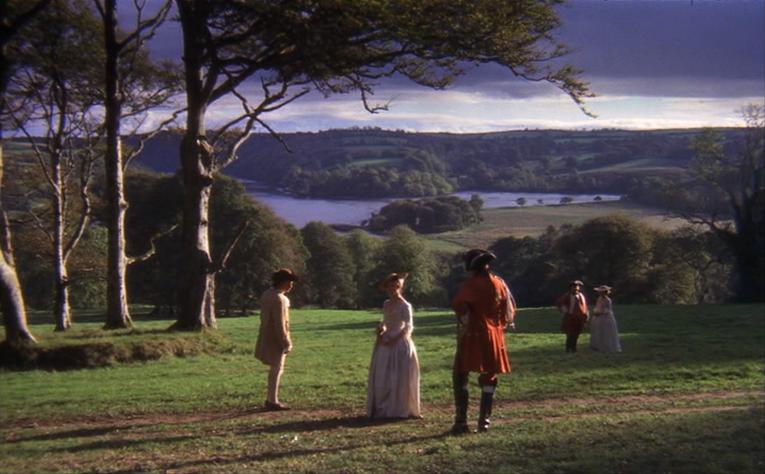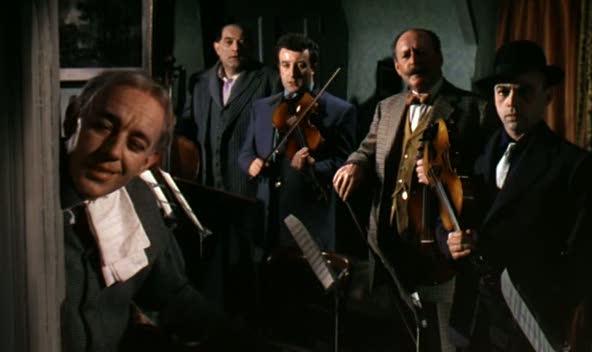From Sight and Sound, Spring 1975. This is probably the most embarrassing review I’ve ever published (in addition to being one of the very worst) — particularly for reasons given in a quite reasonable letter published in the next (Summer 1975) issue, which I’ve reproduced below, along with my reply. But it’s an instructive sort of embarrassment, which is my main reason for reproducing it now, after some initial reluctance. -– J.R.

Distant Thunder
‘Over five million people in Bengal starved or died in epidemics because of the man-made famine in 1943.’ The title appears over the final shot of Satyajit Ray’s film –- a quasi-expressionistic, rather Bergmanesque vision of silhouetted figures standing on the edge of a precipice, composing a line of seemingly endless breadth behind the camera’s fateful retreat – and is clearly the crucial piece of information around which the preceding 100 minutes have been constructed. Yet the sheer immensity and horror of this unambiguous fact, essentially as unfilmable as it is unimaginable beyond the abstraction of statistics and other metaphors, can operate structurally only as a coda and ‘footnote’ to the rest of the discourse, even if it paradoxically comprises this discourse’s raison d’être. Read more
From the March-April 1976 Film Comment. I’m somewhat irritated today by the hectoring tone of this, but I tend to think most of my arguments are sound — apart from my far-too-facile insistence that Barry Lyndon is a failure, which I would now dispute. — J.R.

So BARRY LYNDON is a failure. So what? How many “successes” have you seen lately that are half as interesting or accomplished, that are worth even ten minutes of thought after leaving them? By my own rough count, a smug little piece of engineering like a CLOCKWORK ORANGE was worth about five. I’m reminded of what Jonas Mekas wrote about ZAZIE several years ago: “The fact that the film is a failure means nothing. Didn’t God create a failure, too?”
Anyway, what most Anglo-American critics appear to mean by failure is that they were (a) bewildered and (b) bored by their bewilderment. To some extent, I was bewildered and befuddled too. So what? Who says we have to understand a film back to front before we can let ourselves like it? “The fault, dear Brutus, is not in our stars,/But in ourselves, that we are underlings.”

London critics got to see BARRY LYNDON at least a couple of weeks before their New York counterparts, so the contrasts and comparisons that were drawn were somewhat different: while most of the former chastised Kubrick for his beautiful images before going on to rave about HARD TIMES (known over here as THE STREETFIGHTER) or A WOMAN UNDER THE INFLUENCE, the latter were usually more equitable in establishing that BARRY LYNDON and LUCKY LADY were both failures, leading the unwary to suspect that they might as well be equivalents. Read more
From the March 26, 2004 Chicago Reader. This may help to explain, at least in part, why I had no desire to see the Coens’ other remake, True Grit. (Two other reasons that come to mind: I didn’t like the original and I’m sick of American revenge plots, offscreen as well as onscreen.) — J.R.


The Ladykillers
** (Worth seeing)
Directed by Joel and Ethan Coen
Written by the Coens and William Rose
With Tom Hanks, Irma B. Hall, Marlon Wayans, J.K. Simmons, Tzi Ma, Ryan Hurst, Diane Delano, and George Wallace.
The day after I saw the Coen brothers’ remake I watched the original — the Ealing Studios’ The Ladykillers, a popular 1955 English classic directed by Alexander Mackendrick a couple of years before he directed Sweet Smell of Success in the U.S. I’d taped the original over a decade ago, long before American Movie Classics started recutting features and inserting commercial breaks. AMC may assume that any film in which English is spoken is somehow American, but The Ladykillers, scripted by William Rose, is so thoroughly English I doubt its humor could be fully understood without reference to the English character or 20th- century English history. Read more




